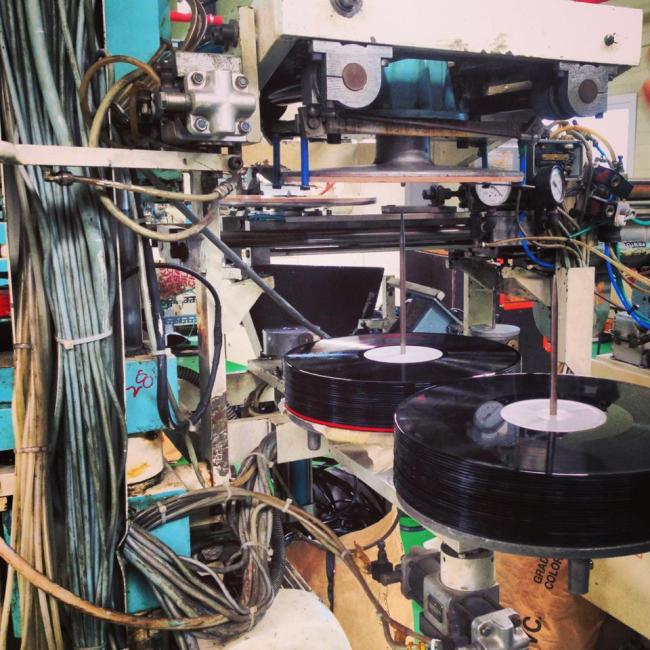The LP Factory stands alone as South Korea’s only manufacturer of LP records.
Its founder and CEO, Jason (Gil-yong) Lee is a music industry expert and devoted LP fan who started the factory on a whim.
Today, the factory churns out more than 4,000 records a year to export overseas.
The factory is a mid-sized warehouse in an industrial park in Gimpo, Gyeonggi Province. Large machinery imported from Germany and France stands inside, along with boxes of cardboard, plastic and PVC lining along the floor.
Its founder and CEO, Jason (Gil-yong) Lee is a music industry expert and devoted LP fan who started the factory on a whim.
Today, the factory churns out more than 4,000 records a year to export overseas.
The factory is a mid-sized warehouse in an industrial park in Gimpo, Gyeonggi Province. Large machinery imported from Germany and France stands inside, along with boxes of cardboard, plastic and PVC lining along the floor.

The hydraulic press machines will etch a master sound recording on discs, followed by PVC coating pressed on by a stamper.
Lee and his workers will usually listen to every singe LP to check the sound quality. A pile of destroyed LPs occupies one corner, which Jason explains means about 30 percent of the total stock goes in the bin.
After a final check, the LPs are packaged and exported to Japan.
In an interview with The Korea Herald, Lee explained how he started the business and what he saw in store for the future.
KH: Why did you open the LP Factory?
Lee: I used to organize rock festivals like the Valley Rock Festival and foreign artists and bands like Maroon 5 coming to tour in Korea. I would buy their LPs and get their signatures on them, which I have even today.
One night, my friends and I were drinking and we suddenly decided that it would be cool to take some of our favorite songs and put them on an LP.
From there, I decided to start an LP factory. I hadn’t planned anything; I just thought “Okay, let’s do it!” The LP Factory opened on September 1, 2011.
KH: Do you compete with other record factories?
Lee: In 2004, all LP manufacturing in Korea stopped and there was only one LP factory in Japan.
Currently, we aren’t competing with the Japanese factory because the market is different in Korea. In the future, however, I plan to expand the market into Asia.
KH: Has the number of LP sales increased over the last few years?
Lee: I think in general there is a rise in LP sales, but we haven’t seen that at the factory yet.
More broadly, secondhand LPs and LPs from foreign markets are selling more. Britpop is the biggest factor in LP sales.
KH: Do you think the demand for LPs in Korea will increase gradually?
Lee: For the LP Factory currently, business is hard. The main reason why has mainly to do with the way the Korean music industry works. Even in the past, Korean music was not big on manufacturing LPs because in Korea, the artist doesn’t make all the decisions in making the music. In Korea, most of the time the artist and producer don’t agree with each other. Even if the artist wants to make an LP, there’s a big chance the producer won’t agree with that.
Recently though, they have started looking into expanding K-Pop merchandise to include LPs.
KH: How can Korea catch up with the international LP trend?
Lee: If you look at foreign bands like Muse, Oasis, Coldplay and Maroon 5, they are four big names that come out with LPs and CDs hand-in-hand, because they want their music to last forever, not just in electronic format, but also on LPs. Those artists really take pride in their work, which is the main reason why they want it on an LP.
Korean artists need to want to have their music on an LP but you don’t see this in Korea. Here, the music industry is mainly comprised of idolized pop stars who don’t make their own music. They are affiliated with an agency and don’t really have their own creative input. These people probably don’t even care that their work is not on an LP.
KH: What is the difference between MP3 files, CDs and LPs?
Lee: The sound is better on an MP3 or a CD, but you listen to an LP because there’s a different feeling in listening to it. With the LP, the sound is part of why some people listen to it, but it is also collectable item and there’s meaning in collecting it. With CDs, a lot of people throw them in their cases, but people really take care of LPs and often put them on display. They want to show off their LPs to other people.
LPs are nicer to listen to because MP3s and CDs are things that you can listen to really easily on your computer or phone, whereas to listen to an LP you need to take your time and there’s a process involved. That is different from how people in Korea live today, as everyone is so busy. Even if you take an hour to go through the process of listening to an LP, you can have that one hour of relaxation and it can become kind of a ritual.
KH: If the sound quality isn’t any better, why would someone listen to an LP?
Lee: When I was younger, my dad bought me a CD player and a CD. When I first listened to it, the sound was so crystal clear that I was shocked.
So for a person to listen to an LP after only listening to CDs and MP3s, they will also probably be shocked by how different the sound of an LP is.
By Astha Rajvanshi (astha.raj06@gmail.com)
-
Articles by Korea Herald



















![[Today’s K-pop] Treasure to publish magazine for debut anniversary](http://res.heraldm.com/phpwas/restmb_idxmake.php?idx=642&simg=/content/image/2024/07/26/20240726050551_0.jpg&u=)